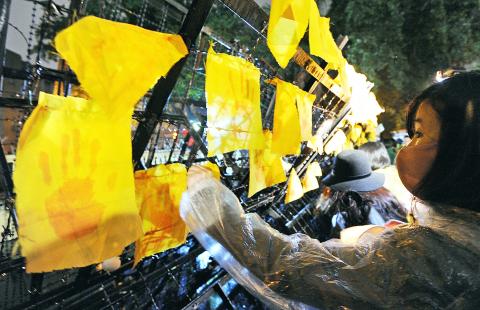Leading Sunflower movement figures and opposition legislators yesterday voiced their anger over the police crackdown during the occupation of the Executive Yuan in Taipei on the night of March 23 to the early hours of March 24 last year, saying that many of the victims seeking justice have been left out in the cold.
At the Legislative Yuan’s plenary session yesterday, Taiwan Solidarity Union Legislator Chou Ni-an (周倪安) questioned Premier Mao Chi-kuo (毛治國) over the matter, accusing the government of turning a deaf ear to victims’ demands for justice to be served.
Chou, who sustained injuries during the incident on March 24 last year, said she was there to protect the students and experienced brutal treatment by the police.

Photo: Liu Hsin-de, Taipei Times
“After I was knocked to the ground, four riot police used their shields and boots to kick and hit me repeatedly,” she said.
“We know that videos from police cameras can be used to identify students and protesters, as the government was able to indict them,” Chou said. “Why can the same footage not single out any police officers who beat people so viciously?”
Chou called on the government to come clean on that night’s crackdown and “end the cover-up,” accusing authorities of destroying evidence to prevent the prosecution of police officers.
The occupation of the Executive Yuan, led by student Dennis Wei (魏揚) and others, was a spinoff of the Sunflower movement that occupied the Legislative Yuan’s main chamber from March 18 to April 10 to protest the government’s handling of the cross-strait service trade agreement.
On Monday evening, dozens of students and activists took part in a silent procession around the Executive Yuan compound to mark the one-year anniversary of the bloody police crackdown. Led by youth activist group Black Island National Youth Front, the crowd hung handkerchiefs with bloody hand prints on the barbed-wire barricades.
Wei, a member of the group, said the images of riot police carrying batons and marching in locked steps toward the sit-in crowd often came back to haunt him.
“I will never forget what happened that night, especially not my friends bleeding from being beaten by police as they held me and cried out in pain,” said Wei, who is one of 119 Sunflower movement protesters who have been indicted.
“Over the past year, neither former premier Jiang Yi-huah (江宜樺) nor former National Police Agency director-general Wang Cho-chiun (王卓鈞) have apologized for their roles in these acts of violence against the public,” he said.
He added that as the public commemorates the one-year anniversary of the Executive Yuan occupation, “we must point out these two as the main perpetrators of the violence and not, as government officials are doing now, blaming the protesters for their ‘irresponsible’ actions.”

Alain Robert, known as the "French Spider-Man," praised Alex Honnold as exceptionally well-prepared after the US climber completed a free solo ascent of Taipei 101 yesterday. Robert said Honnold's ascent of the 508m-tall skyscraper in just more than one-and-a-half hours without using safety ropes or equipment was a remarkable achievement. "This is my life," he said in an interview conducted in French, adding that he liked the feeling of being "on the edge of danger." The 63-year-old Frenchman climbed Taipei 101 using ropes in December 2004, taking about four hours to reach the top. On a one-to-10 scale of difficulty, Robert said Taipei 101

A preclearance service to facilitate entry for people traveling to select airports in Japan would be available from Thursday next week to Feb. 25 at Taiwan Taoyuan International Airport, Taoyuan International Airport Corp (TIAC) said on Tuesday. The service was first made available to Taiwanese travelers throughout the winter vacation of 2024 and during the Lunar New Year holiday. In addition to flights to the Japanese cities of Hakodate, Asahikawa, Akita, Sendai, Niigata, Okayama, Takamatsu, Kumamoto and Kagoshima, the service would be available to travelers to Kobe and Oita. The service can be accessed by passengers of 15 flight routes operated by

Taiwanese and US defense groups are collaborating to introduce deployable, semi-autonomous manufacturing systems for drones and components in a boost to the nation’s supply chain resilience. Taiwan’s G-Tech Optroelectronics Corp subsidiary GTOC and the US’ Aerkomm Inc on Friday announced an agreement with fellow US-based Firestorm Lab to adopt the latter’s xCell, a technology featuring 3D printers fitted in 6.1m container units. The systems enable aerial platforms and parts to be produced in high volumes from dispersed nodes capable of rapid redeployment, to minimize the risk of enemy strikes and to meet field requirements, they said. Firestorm chief technology officer Ian Muceus said

MORE FALL: An investigation into one of Xi’s key cronies, part of a broader ‘anti-corruption’ drive, indicates that he might have a deep distrust in the military, an expert said China’s latest military purge underscores systemic risks in its shift from collective leadership to sole rule under Chinese President Xi Jinping (習近平), and could disrupt its chain of command and military capabilities, a national security official said yesterday. If decisionmaking within the Chinese Communist Party has become “irrational” under one-man rule, the Taiwan Strait and the regional situation must be approached with extreme caution, given unforeseen risks, they added. The anonymous official made the remarks as China’s Central Military Commission Vice Chairman Zhang Youxia (張又俠) and Joint Staff Department Chief of Staff Liu Zhenli (劉振立) were reportedly being investigated for suspected “serious